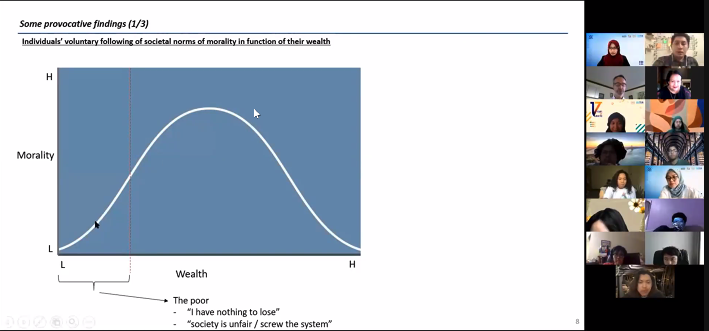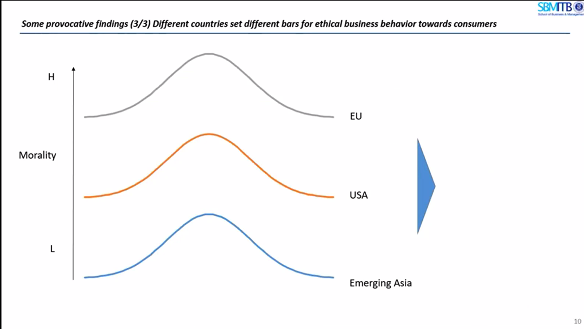Most startups and SMEs aren’t willing to follow the rules, making it harder to obtain bank loans and grow into a big company. It’s not that they don’t want to follow the rule, but they do this to survive.
The amount of revenue they are making wouldn’t be enough to follow every rule in the system. This phenomenon is like a bell-shaped curve.
It is said by a guest lecturer for SBM ITB’s Introduction to International Business class, Christian Van Schoote, an e-commerce, retail, and investment professional. He explained the importance of ethics and morality while running a business based on his experience working in various multinational and national companies.
 He added, in big companies, immoral activities could occur as well. In a company he worked at previously, Christian observed several immoral behaviors. He argued that people in big organizations only care about their part of the job and don’t think about the company as a whole. This attitude can lead to financial problems, especially when dealing with tax payments.
He added, in big companies, immoral activities could occur as well. In a company he worked at previously, Christian observed several immoral behaviors. He argued that people in big organizations only care about their part of the job and don’t think about the company as a whole. This attitude can lead to financial problems, especially when dealing with tax payments.
When asked regarding the ethical condition of businesses in Indonesia in relation to the colonialism of the Dutch before the independence, Christian answered that it has less to do with colonialism as he felt that the country leaders, namely Soekarno, Hatta, and Ki Hajar Dewantara, has created an excellent basis of the country and has led the country to greatness after the independence, a fact that isn’t applicable in many countries post-colonialization.
 However, in his opinion, during Soeharto’s regime, the ethical condition deteriorated, where he created a sultanate of some sorts, where everything has to go back to him. The conglomerates that were ruling the economy in Soeharto’s era are still in place even today.
However, in his opinion, during Soeharto’s regime, the ethical condition deteriorated, where he created a sultanate of some sorts, where everything has to go back to him. The conglomerates that were ruling the economy in Soeharto’s era are still in place even today.
As a result, several big companies monopolize the industry, squeezing the smaller players out of the market.
For example, in the health industry, Indonesia has the most expensive essential medication globally because there is no sound protection of consumers in terms of medication. Big companies control the production of medication. The government owns Two-third.
The government protects against foreign players, but in reality, they protect State-owned enterprises from internal conflict, which is usually detrimental to the customers as the price will be multiplied.




